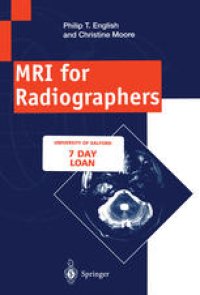
Ebook: MRI for Radiographers
- Tags: Imaging / Radiology
- Year: 1995
- Publisher: Springer-Verlag London
- Edition: 1
- Language: English
- pdf
One of the most important developments in diagnostic imaging over the last decade has been magnetic resonance imaging (MRI). Its ability to differentiate between tissues and give patholog ical information about diseases has led to earlier treatment, thus increasing the likelihood of recovery. The images produced using this technique give superb anatomical detail in any plane and are obtained without the use of ionising radiation. The increased use of MRI has presented radiographers with a number of challenges, and because we are no longer dealing with ionising radiation understanding the subject can some times be confusing. We hope that this text will help radiographers and student radiographers to further their knowledge and unravel the mysteries of MRI. Philip T. English Christine Moore Contents 1 Basic Principles . . . . . . . . . 1 History ..... . 1 Atomic Theory . . 1 Magnetic Theory . 2 Resonance 4 Relaxation. . . . . 5 2 Instrumentation........ 9 The Magnet .. 9 Shim Coils ........... . 12 Gradient Coils ......... . 13 RF Transmitter/Receiver Coils. 14 The Computer . . . . . . . . . 18 3 Pulse Sequences. . . . . . . . . 19 Saturation Recovery (Partial Saturation) 19 Spin Echo (SE) . . . . . . . . . . . . . 20 Multiple Spin Echo. . . . . . . . . . . 22 Fast Spin Echo (FSE) or Turbo Spin Echo (TSE). 23 Inversion Recovery (IR) . . . . . . . . . . . . . 26 Gradient Echo .................. . 28 Magnetisation Transfer Contrast Imaging (MTC) 34 4 Image Production. . . . . . . .
This book gives a concise yet comprehensive description of the essential aspects of Magnetic Resonance Imaging (MRI). The authors have aimed to incorporate as many aspects of MRI as possible from basic principles to advanced topics and to explain them in terms which can be understood by anyone regardless of their MRI experience. Included in this are descriptions of instrumentation and methods as well as a practical guide to safety and techniques. The authors' treatment of the subject distinguishes the book from other introductory texts by virtue of the extensive use of figures and tables.